Staying Fit

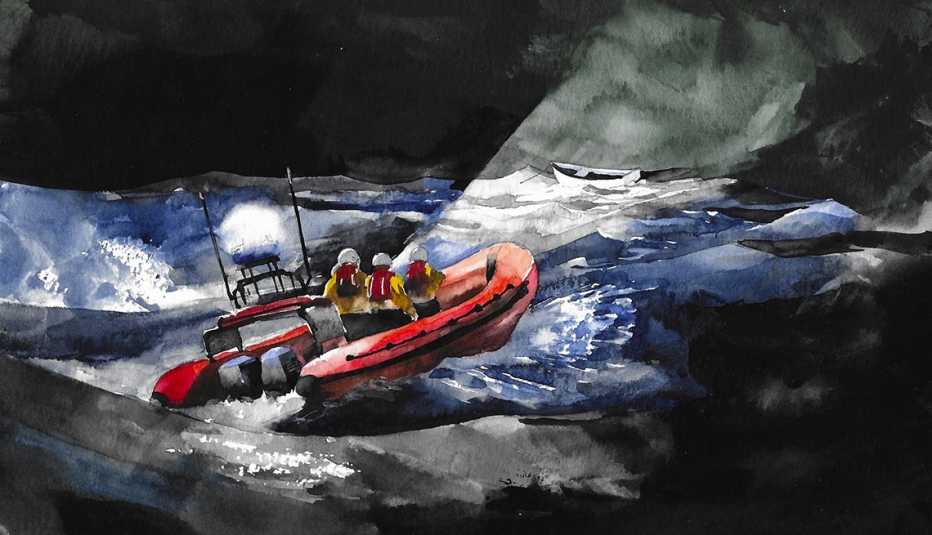
Listen to chapters 1-6 narrated by Jack Holden, or scroll down to read the text.
Chapter One
THE MAN BLEW INTO GREYSTONE at the height of a September gale. That was how the story went, at least. Suddenly he was there, leaning against the bar of the Maiden’s Prayer, face as brown as a nut, white hair so short that it must have been cut that day, laughing at one of the landlord’s jokes. The rain dripped off his waterproofs, and all his worldly belongings were in an oilskin bag at his feet. There was no indication as to how he’d arrived. He hadn’t driven himself. There was no car. But somehow Jem Rosco, adventurer, sailor and legend, had arrived in their midst.
He told them that he’d rented one of the cottages that climbed up the bank behind the pub.
‘But I was desperate for a pint, boys, so I called in here on my way.’ A wink.
Harry Carter, the landlord, couldn’t tell if the wink was meant to indicate that this was a lie, a joke, or to include the other customers standing at the bar in his desire for a drink. They too, the wink seemed to imply, must know how it felt to be so desperate for a pint that they wouldn’t drop a heavy bag off first.
Rosco had two pints of local, cloudy cider, then he slung the bag, which was big enough to hold a child, onto his back and was on his way.
He was in the Maiden’s every night after that. There was never a specific time. He’d appear suddenly, all smiles. Sometimes he’d stay at the bar, chinwagging with Harry. Other nights he’d drift around the room, landing at a table – the playgroup mums on their regular night out, or an elderly couple playing dominoes by the fire – like a piece of flotsam washed up by the tide. He was always friendly, always chatty, but he never really gave anything away. When anyone asked if the move to Greystone was permanent, or if he was there on a holiday, planning another journey perhaps, he’d only touch the side of his nose and grin.
‘I’m here to meet someone. Someone special. I’m expecting them any day.’
He never stayed for more than two pints and then he was off again, sometimes with a little wave to the other customers, sometimes just disappearing, so that suddenly they realized he was no longer there.


AARP Membership— $12 for your first year when you sign up for Automatic Renewal
Get instant access to members-only products and hundreds of discounts, a free second membership, and a subscription to AARP the Magazine.
They all knew which cottage he’d rented. It was at the end of the terrace, right on the top of the hill, owned by Gwen Gregory, who’d grown up at Ravenscroft Farm, and who cleaned in the Maiden’s. It had the view across the village to the sea. Nobody had any need to walk past it. Beyond the single row of houses, there were only the remains of the quarry, which was the original reason for the village’s existence.
But now people walked past the house anyway, out of curiosity. They were interested to know if Jem Rosco’s mysterious visitor had arrived yet. They’d see the man sometimes looking out of the upstairs window, focused on the horizon, as if he was watching for a boat. Even in this stormy weather, a skilled sailor might float in and tie up at the jetty. There were two curved piers to shelter the narrow bay, built when stone from the quarry was carried out on big, flat barges. People said that one of his madcap adventuring friends would appear. Or the woman he was waiting for. Because most of the villagers had convinced themselves that it would be a woman.
Then one night, a few weeks after his arrival, Jem Rosco didn’t come to the Maiden’s for his usual two pints of rough cider. The regulars immediately noticed his absence. They chatted amongst themselves and speculated that perhaps the expected visitor had finally arrived. Perhaps old Jem would bring the stranger into the bar the following night, and finally they’d know what all the secrecy was about.
But Jem Rosco didn’t appear again. They felt cheated. He might be an outsider but for a while he’d become part of the community. He was a celebrity, who’d been on television, sharing his travels – making his way up the Amazon, sailing single-handedly around the southern oceans – with the world. Part of his glory had rubbed off on them, but now the excitement was over.
Until the following morning, when the coastguard received an emergency call from a fishing boat in difficulty, sheltering from the storm in the lee of Scully Head.
Then, it seemed, the excitement had only just started.
Chapter Two
MARY FORD WAS WOKEN by her pager. She looked at the bedside clock. Five in the morning. She’d marked herself as available on the lifeboat rota because her father was staying, and there’d be someone to look after the kids if she were called out. Time was slipping away for adventures like these. Soon, Arthur would need a full-time carer, and she couldn’t expect her dad always to be there. So, she’d thought, she’d best make the most of it while she could. She was out of bed and dressed almost without thinking. She loved this. The excitement of a shout, the camaraderie and laughter with the guys. And she was helm now. Almost three years of training and she was in charge. In a place like Greystone, a woman in charge didn’t happen very often. Sammy Barton was lifeboat operations manager this morning, and he’d like it even less than the others. But Sammy could stuff it.
She knocked at her father’s door. He’d most likely be awake already. Since Mary’s mother had died, the man slept poorly. Mary often saw his light on in the early hours, and knew that he was scrolling down his phone. Sometimes she heard the buzz of the radio and the measured tones of the BBC World Service throughout the night. Her father stayed over quite regularly now, ostensibly to help with babysitting – Mary had sent her bloke packing soon after Arthur was born – but really because he found it hard being alone in the cottage in the woods just outside Morrisham. It had been easier when her mother had been alive, even after they’d moved her into the hospice. Then her dad had a purpose: planning the visits, and the treats to brighten his wife’s day. Now, he was bereft.
Dad was a real help, though. Since Arthur had become ill with the dreadful Jasper Lineham Disease, her father had become an important part of the household. She’d never heard of JLD until Arthur’s diagnosis and now she could think of little else. The cruel disease ate away at her son, like the tide eroding a sandstone cliff. There was the occasional good day when she had a flicker of hope, but it never lasted. She wouldn’t have trusted anyone other than her father to stay with her boy. She’d never have gone out with the lifeboat, for example, if he hadn’t been there, and that gave her the freedom and the excitement she craved.
Today, Alan Ford was lying on his side and looking at his phone. Checking Facebook or Twitter. Finding the company that her mother would once have provided, in social media friends and old work colleagues.
‘I’ve got to go.’
‘The lifeboat?’
Mary nodded.
‘In this storm?’ Her father was trying to keep the anxiety from his voice, but Mary knew what he was thinking. Bad enough to lose Claire. He couldn’t bear to lose a daughter too. ‘The wind’s dropped. Can’t you hear? It’s not supposed to blow up again for several hours. We wouldn’t be allowed to launch if the forecast was too poor.’ A pause. ‘I have to go. There’s everything Isla needs for school in her bedroom, but I’ll probably be back by then. Artie can go too if he’s feeling up to it.’
‘Sure. Of course. On your way.’ Despite his anxiety, Alan wouldn’t want to deny Mary the adventures that he’d experienced throughout his life.
Outside, it was strangely quiet after the storms of the previous days. A lull between westerly fronts. There’d be a big sea still, but wind shouldn’t be a problem. It would soon be light; there was already a grey sheen to the sky behind the houses to the east. It would be quicker on foot than to drive and Mary hurried down the street to the quay, but she didn’t quite run. The pavement was still slick from rain and the last thing she needed was to break a bone, which would keep her out of the boat for weeks. She loved this – being out when everyone else was in bed; the adrenaline already starting to pump, knowing that she was being useful, that she might save someone’s life.
Sammy Barton was already there when she got to the lifeboat station, and she arrived at almost the same time as a fellow crew member: Ollie Shebbeer, a mechanic in Greystone’s only garage. Paul, the tractor driver was already working on the beast of a machine, which would push the lifeboat onto the shingle beach and drag it into the water. The sea was too shallow here for a conventional slipway, and this tractor had cost more than the boat itself. It could be almost wholly submerged and still work. In the kit room she started getting into the suits which were hanging under her name. An inner all-in-one to keep her warm, and an outer waterproof, which was supposed to keep her dry, but never quite managed it in very bad weather. The other two crew members arrived just as she was ready.
Sammy, the lifeboat operations manager, joined them and started passing on information.
‘Coastguard received a mayday on channel sixteen. A fishing boat out of Ilfracombe called the Anna Louise, sheltering just the other side of Scully Head. Then they lost contact.’
‘Any other vessel nearby?’
Barton shook his head. ‘Nobody else had responded to the call.’
Mary grabbed the first-aid bag with the O2 kit and the pump, and then they were in the boat. Mary was in charge, but she let Ollie sit in the front seat and take the wheel. He was less experienced, but she preferred to sit just behind, where she could see the radar, and be in charge of the navigation.
The Atlantic 85 was a rigid inflatable boat, a RIB, but solid and beautifully proportioned. And bright orange. She was named the Lesley Alexander, after the woman who’d left a legacy to pay for her. The station door was opened, and the tractor nudged the boat and the trailer down onto the shore and over the shingle until they were floating. Then the trailer was pulled away and they were on their way. The waves breaking on the beach were as big as Mary had expected, and the boat pitched and bucked like a fairground ride. She’d never been seasick but she knew some people had thrown up just watching from the shore.
The water close to Scully Point was shallow, and Mary had suspected that the Anna Louise might have gone aground on rocks. The spring tides of the equinox were very high and very low, and it had been dead low water at four in the morning.
When they hit thirty-five knots, out on the open water, the swell was rolling and the Lesley A was bouncing. The boat was open to the elements, and spray covered the bow, blowing into her face and making Mary laugh. This was the real buzz. The rest was important, but this was what Mary had joined up for.
It only took fifteen minutes to arrive at the recorded position. They slowed as they rounded the headland. Behind her, Mary heard a muttered incantation. The older crew didn’t like coming into Scully – an old superstition – and mouthed words to ward off bad luck. Not really believing they’d help, but not willing to chance it. Saying the words, just in case. They were a religious lot, the people of Greystone, but that didn’t stop them buying into the old stories of wrecks and drownings.
They had on the headlights, but Mary saw no sign of a trawler, not even one of the smaller boats that went out after crab and lobster. It occurred to her that this might be a hoax – it happened occasionally – but surely not in the early hours of a day like this. Pissed fishermen would be in bed by five. Then Ollie gave a shout and pointed to port. It was just light enough to see a small, dark shadow, moving with the swell. Not a fishing boat, but a small dinghy or tender, closer into the shore. It wasn’t stranded on rocks. Mary knew this part of the coast and could have drawn her own chart. She’d studied it. For months the maps had been her bedtime reading. The dinghy disappeared, the view of it hidden by a rolling wave, and then it was there again. But the wave didn’t carry it towards the headland.
‘Anchored.’ Mary was running scenarios through her head. ‘Why would anyone want to do that?’
The lifeboat slowed again to walking pace and they drifted towards the dinghy. It wasn’t until they were almost onto it that the man in front of her, who had a better view, yelled, suddenly tense.
‘Casualty. Casualty.’
The spotlight from the boat lit up the dinghy and she turned so that the GoPro video camera on her helmet captured the scene. There was a body in the dinghy, curled into the curve of it. She was suddenly reminded of Arthur as a baby, lying in his Moses basket. He always managed to turn onto his side, even as an infant. But Arthur had been wearing a sleep suit, had been covered by a blanket, and this person was naked, the skin white in the bright lights.
Almost immediately, the training kicked in. This was a dash and grab moment. This was what she’d trained for. She was sitting where the side of the inflatable was at its lowest. As Ollie allowed the lifeboat to touch the dinghy, she slid into it, steadying herself as it rocked with the movement, then she lifted the casualty into her arms. He was less heavy than she’d been expecting. She held him low and rolled him over to the remaining crew members, who were waiting in the Lesley A. They laid him across the second seat, just as they’d been taught in exercise, Ollie holding his head. They wrapped him in a foil space blanket and Mary started CPR.
But as she was counting the compressions and the breaths, she knew this was useless. They’d been told this was what should happen. Unless the body’s rotting or it has no head, you try CPR. That was what the trainer had said, a grin on his face, and they’d all chortled along as if it were a joke. It’s not your job to declare life extinct.
This man was cold as ice and lifeless, though, and the limbs were rigid.
Seth was on the radio, organizing another lifeboat to launch in case the Anna Louise was still around somewhere, and in trouble. Calling for the helicopter to be on standby now it would soon be light. ‘I’ll call the ambulance, shall I?’
‘Nah,’ she said. ‘We’ll be back in Greystone well before the ambulance will get there. We need a doctor to declare him dead, and the police.’
Ollie turned the boat for home and the wind was already stronger. Force seven at least now. They’d be lucky to get back before the tide made it tricky on the beach. For the first time, she looked closely at the casualty’s face, and realized that she recognized him. Jem Rosco, national treasure and her one-time hero.
Chapter Three
GREYSTONE BROUGHT BACK memories for Matthew Venn. There was a meeting hall in the village and he’d been brought here by his parents. A visit to the village had always been a treat, and he remembered this odd, isolated place with affection. There’d been a big community of Brethren, with more children than he’d ever encountered in Barnstaple. Outings had been organized: trips to the beach at Morrisham, picnics, social evenings. His parents had been more relaxed and Matthew had been given the chance to shine, to show off his bible knowledge and his faith. He’d basked in the admiration of the older members.
‘What a clever little chap he is!’ they’d say. And Dorothy would glow.
Since losing his faith, and marrying Jonathan, he hadn’t been back. As they approached, he felt a little embarrassed by the boy he’d been, but interested to visit again a place where he’d been so happy.
Greystone wasn’t somewhere that attracted tourists; especially now at the end of September, there was nothing appealing about the place. The beach was rocky, and the gaps between rocks filled with shingle. The rocks were pocked with cockle shells and barnacles, and black with bladderwort. The cove faced north. The cliffs were hard and forbidding, and for much of the day there was no sunlight. The pub served the local cider, but there were no fancy meals. When houses came up for sale, potential second-homers came to look, but never bothered buying. This wasn’t the North Devon of their dreams. The village was still scarred by the enormous quarry on the hill beyond it. It felt industrial, not idyllic. Real. As a precocious adolescent, he’d appreciated that.
Because there was nothing pretty, or appealing, about the place, locals could afford to live in Greystone. Young couples stayed out of necessity, because housing was cheap to rent and to buy. There was broadband, so remote working was possible. A few cottage industries had grown up – cider-making, a pottery – and they employed a handful of people. Just inland there were farmers who needed occasional contract labour. Commuting to Bideford was just about possible. The village had its own primary school, and there was a high school in Morrisham, five miles along the coast, for the older kids. This was a community where many people were related and everyone knew their neighbours; no effort at friendliness was needed, and grudges grew unheeded.
Inspector Matthew Venn had a clear sense of the place. He’d heard his parents talk about Greystone often enough. His mother had wanted to move there at one point, but, for once, his father had stood firm. It was too remote. Too self-contained.
Matthew had always been an inveterate eavesdropper, and as a youngster he’d store away details, running over them later, trying to make sense of them. He didn’t think that much would have changed. Now he drove to the village through wind that made steering tricky, and rain so hard that the wipers on full speed wouldn’t clear the windscreen. The storm had returned big style since they’d left Barnstaple. He passed on his thoughts to Jen Rafferty, his sergeant, who was sitting beside him.
‘It feels different from anywhere else in the county. It’s very remote.’ He paused. ‘A bit bleak, I suppose.’
Jen Rafferty didn’t answer directly. She was a Scouser, passionate and impulsive. She’d left her home city to escape an abusive marriage, but Venn knew she still missed the Liverpool skyline, seen from the west side of the Mersey. She thought everywhere in North Devon was remote. Now, it seemed, she was more interested in the victim than the geography. ‘Who is this Jeremy Rosco?’
‘Haven’t you heard of him? At one time, he was never off the television. He’s a hero. Well, almost. He grew up just round the coast and went to school in Morrisham. The only son of a single mother. He didn’t do well at school; he was only ever interested in being on the water.’
This was the story told in documentaries and interviews. Matthew wondered how true it was, but he continued:
‘Rosco went on to become the youngest person to sail round the world single-handed, and he became a kind of legend. He moved on to other expeditions: he did both Poles with just a small team, and walked up the Amazon. For his subsequent adventures he had a television camera crew in tow, so he became a kind of media celebrity.’ Venn paused. ‘I’ve not heard so much of him in the last few years, though. He must have been in his late fifties. Perhaps he retired.’
‘So, what was he doing in Greystone?’
Venn turned to her. ‘That’s what we’re here to find out. Why he came back here, and why he died close by.’
The journey through the village was precipitous, made even more dangerous by the wet roads, the water forming a stream on each side. The houses were grey: stone from the quarry, the roofs slate. Where the land flattened, they passed the school, a shop and the pub, the Maiden’s Prayer, named after a wrecked ship, but considered a little blasphemous by Matthew’s mother. Behind the pub, a steep row of terraced cottages led to the abandoned quarry. The pub sign, painted with a ship in full sail, swung dangerously in the gale. Venn drove on to the quay.
The rain stopped when they arrived, but the wind seemed to increase. It blew from the north-west, straight into their faces. A uniformed officer, anonymous in navy waterproofs, was sheltering behind the wall formed by the quay and the lifeboat station, looking out for them. Presumably his colleague was inside. The officers had driven their car as near as they could, down the slipway which led to the beach. Venn parked behind it. He struggled to hold on to the car door when he opened it. The wind caught it and seemed about to tug it from his grasp, to rip it from the chassis.
It had taken Venn and Jen an hour to drive from Barnstaple. The officer was young and obviously relieved to see someone senior in charge. He was wet and cold. Venn wondered why he hadn’t waited inside. Perhaps this was his first dead body, and he was of a squeamish disposition.
‘Just show us where he is and then grab a coffee in the pub.’ Venn wasn’t sure that a pub like the Maiden’s would serve coffee, but word about the incident would have spread and the village would be glad to have more news. They’d make an exception for someone in uniform.
The constable was local. ‘There’s a doctor in the village and the crew had him waiting for them. Usual procedure if there’s a death.’ He paused. ‘They had to lift the body into the lifeboat to bring him back. That’s standard apparently, unless it’s so far gone that you know for certain there’s nothing you can do. They left the dinghy where it was. Appledore lifeboat will tow it in. They know not to touch it more than they need to tie a line to it. Jimmy Rainston will have made sure of that. They’ll take it back to their station. In this wind, it’s too dangerous to try and get it in here. Their operations manager wasn’t even sure he wanted them to go out to fetch it, but they decided to give it a go.’
Venn nodded his approval. ‘Rainston’s your colleague?’
‘Yes, sir. We were here waiting when the lifeboat came in and one of us has stayed with the body all through.’
‘Good. Doctor Pengelly is on her way.’ Matthew was speaking almost to himself.
Jen was out of the car, red hair flying in the gusts of wind, a bright banner against all the grey. ‘A bit odd, isn’t it? Was Rosco killed in the dinghy?’
‘The doctor says not. There was not enough blood apparently. The crew said the dinghy was clean. He reckons the man was stabbed elsewhere.’
‘Then put in a dinghy and floated out to sea?’ Matthew frowned.
‘Towed most likely. Because of the anchor. Or rowed.’
‘Of course,’ Matthew said. ‘It’d be impossible to do that remotely.’
‘Like I said.’ Jen pulled her coat tight around her. ‘A bit odd.’
There were lights on inside the lifeboat station, very bright, casting hard shadows. The police officer had shown them in through a small side door and, for a moment, nobody noticed them because of the sound of the weather outside. Four men and a woman in RNLI jerseys stood in the kit room, clutching mugs of coffee. Matthew could smell it and was jealous.
A man of around Matthew’s age, in jeans and a Barbour jacket, stood a little apart and was drinking coffee too. The doctor, Venn decided, but he could wait. There was a constable in uniform waterproofs, who must be Jimmy Rainston.
Venn introduced himself to the crew.
‘You brought back the body.’
‘He was dead when we arrived.’ The woman spoke. She had long dark hair tied away from her face, thick dark eyebrows, and eyes which were almost black. ‘I tried CPR, but really it was clear there was nothing we could do.’
‘Where is he now?’
‘Still in the lifeboat.’ It was the oldest man in the room. Short and powerful, with a thick neck and a head like a fighting dog. He’d described himself as the lifeboat operations manager, Sammy Barton. ‘We wanted to put him in a body bag. For a bit of dignity. But Jimmy here said to leave him be.’
‘Quite right,’ Matthew said, but he thought the dead man had been grabbed out of the dinghy and been exposed to the weather on the trip back. Any evidence might well have been washed away by now. ‘The forensic pathologist is on her way. We’ll move him as soon as we possibly can.’
‘No rush.’ Barton’s voice was deep and rough. ‘Even if we got a shout, I wouldn’t allow a launch in this gale anyway. Must be near force nine out there now.’
‘You all recognized him?’
‘Oh yes,’ Mary Ford said. ‘It was definitely Jem Rosco.’ A pause. ‘He’d been staying in the village for a while. And, of course, we all knew him by sight.’
Venn turned to Rainston. ‘Let’s go and see him then.’
The constable led him through into the main body of the lifeboat station. The boat was on a trailer, attached to a huge tractor. It glowed orange. Rosco seemed very small. He was laid across the widest seat of the RIB, his head resting on a folded tarpaulin on the side of the boat. He was quite naked, his hair short and white but there was a strength to him in the shoulders and the arms. No spare flesh, and muscles a younger man would be proud of. Venn could see why Barton had wanted him covered. He’d been a proud man and this was a sad end for him.
He turned to Rainston. ‘Thanks for this. You’ve done all the right things. I’ve told your mate to go up to the Maiden’s to warm through. Why don’t you join him? One of us will head up and chat to you when we’ve finished here.’
‘Sir.’ Rainston was a big man but he scuttled quickly away, giving just a brief last glance at the body before making his exit through the door into the kit room again.
Venn stood for a moment looking down at Rosco. The silence was broken by a squall, the rain battering against the big doors. The walls were covered by photos of other rescues, a roll call of lives saved. But not this one. There’d be nothing to do for a man who was already dead.
Back in the kit room, Venn approached the man in the Barbour jacket. He was dark-haired, slight.
‘You must be the doctor. Thanks for turning out. You live in the village?’
‘For my sins.’
‘Pete grew up here,’ one of the crew said. ‘He ran off to do his training, but we couldn’t keep him away.’
‘My wife had a romantic notion about a practice by the sea.’ The man smiled at Venn. ‘Peter Smale. I’m a GP. I work mostly out of the health centre in Morrisham, but I hold a surgery here two mornings a week.’ He looked at his watch. ‘I should go back there. They’ll be queuing into the road.’
‘Of course. Perhaps we can catch up later.’
‘I’ve taken over an empty shop in the main street. It used to be a greengrocer’s but we’ve done it out. Not the slightest smell of cabbage left.’
The crew grinned politely. Perhaps it was an old joke.
‘I know it,’ Matthew said.
And I know you too. We sat together through the Brethren meetings as young adolescents, as pompous as each other. Our parents were friends of a kind. And so were we.
Smale looked at him as if he, too, had a moment of recognition, but said, ‘I’ll be there all day and I’m usually patient-free for a couple of hours in the afternoon.’ He paused for a moment and then went out through the narrow door onto the quay, letting in a blast of cold air.
Matthew turned to the people who remained. ‘I’m afraid you’ll have to talk us through it right from the beginning, while we wait for the rest of my team to arrive.’ He looked at Barton. ‘So, tell me what happened.’
‘We got the shout from the coastguard. They’d had a mayday by radio, channel sixteen, a vessel in trouble. No details apart from the position. The call was cut short.’
‘But you went to investigate?’ It was hardly a question. Matthew knew they would investigate. A mayday was the equivalent of a 999 call.
‘Of course.’
‘What time was that?’
‘I got the call from the coastguard at four fifty-five. Our boat was in the water by five twenty.’ Matthew was taking that in. He looked at the remaining three men and the woman. ‘You’re all local?’
‘They are.’ Sammy spoke for them. ‘All Greystone born and bred, apart from Mary here. She’s the helm.’ His voice was flat, but Venn could pick up the edge in it. He’d developed a nose for bias of any kind. Being gay in the police service gave you that. What did Sammy disapprove of in Mary? Matthew wondered. The fact that she was an outsider or that she was a woman?
‘How long did it take you to get to the headland?’
This time Mary answered. ‘Less than twenty minutes. The wind and the tide were behind us.’
‘And you were expecting a bigger boat?’
Sammy Barton jumped in. ‘The coastguard had said a fishing vessel called the Anna Louise.’
‘At first, I thought the dinghy was a tender,’ Mary said, ‘and that the bigger boat must be lost. Then we saw what was inside. And anyway, with the anchor—’
Barton interrupted her again. ‘The coastguard has been back to us, and said there’s no boat with that name registered anywhere along the North Devon coast.’
‘So, it was a hoax call,’ Venn said. ‘But they wanted you to find him.’ He thought that was the strangest part of an already bizarre murder. Why not just make a hole in the dinghy and let it sink? Rosco’s body might not be washed up for weeks. Perhaps it would never appear.
He looked at Barton. ‘What’s happening to the dinghy?’
‘Appledore coastguard has towed it in. They’re holding it there.’
Venn nodded. Another complication to a case that was already the strangest he’d ever investigated.
Chapter Four
VENN LEFT JEN in the lifeboat shed to talk to the crew and wait for the pathologist and crime scene manager. Sally Pengelly and Brian Branscombe were regulars, part of the team. He thought that perhaps Brian would have been better heading straight to the lifeboat station in Appledore to check out the dinghy. Sometimes, though, the CSI said, the body itself was a crime scene. Branscombe was already taking his video, photos from every possible angle. The wounds looked like stabbings to Venn, but the death would remain unexplained until Sally Pengelly had seen the man. In the meantime, he would treat it as murder. It could be nothing else.
Venn stood in the porch of the Maiden’s Prayer. He’d never been inside, and he smiled, wondering what his mother would say. The thought came less often these days, but still her voice was at the back of his head at times of crisis. Jonathan always said he shouldn’t blame his mother for his self-doubt.
She’s a lonely old woman. You’re an adult, and you should be content in your own skin. Own your own shit and give her a break!
For Matthew, it wasn’t that easy. Dorothy was his mother, and, when he’d lost his faith, she’d chosen the Brethren over him.
He walked inside. It was too early for lunchtime opening and the two constables were alone with the landlord. The pub was less gloomy than he’d imagined. There were pale wood tables and the walls were white, recently painted. The old traditions had been kept, though. Above the bar were curling pictures of bearded men, former lifeboat helms, and newspaper clippings describing apparently heroic rescues. A photograph of the darts team holding a trophy. The funeral service sheet for an elderly regular. Venn introduced himself to the man behind the bar.
‘Harry Carter. I own this place. For my sins.’
It was the second time the phrase had been used that morning. For someone with Venn’s upbringing, the words resonated.
‘Any chance of a coffee?’ He saw the policemen had mugs on the table in front of them.
‘Sure.’ Carter disappeared into a room behind the bar.



























































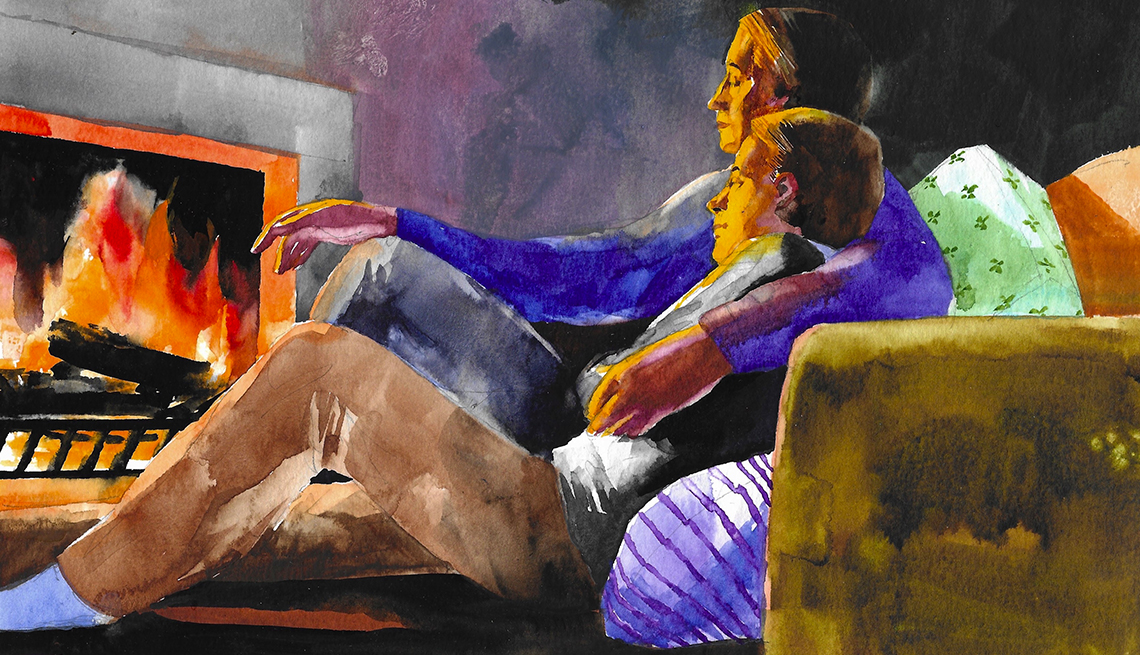
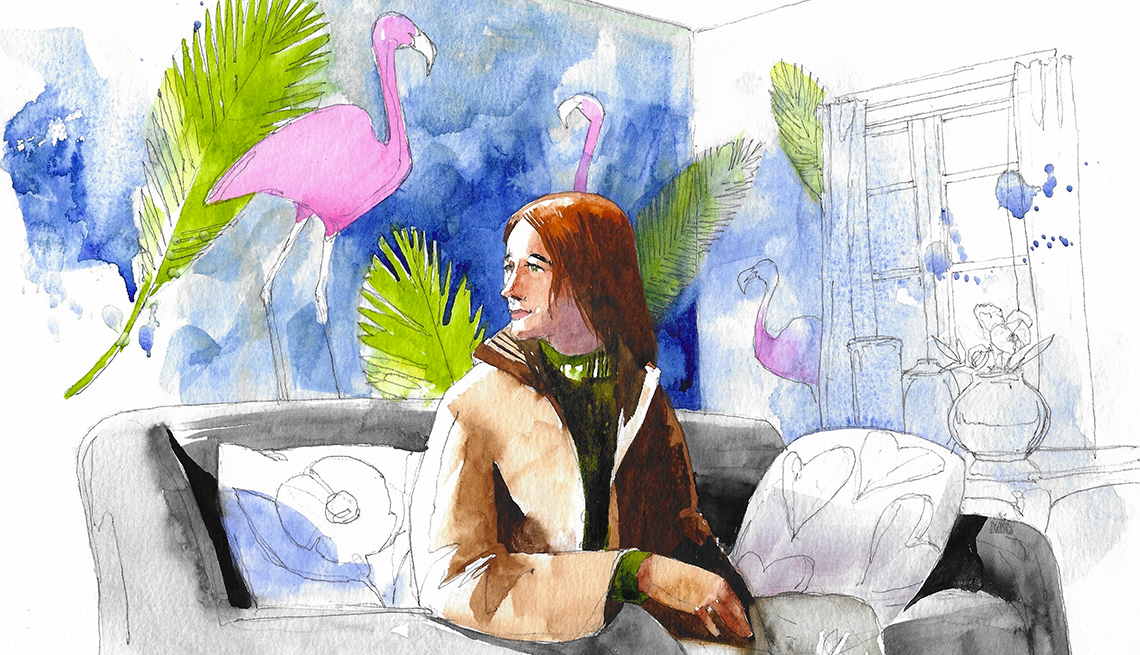
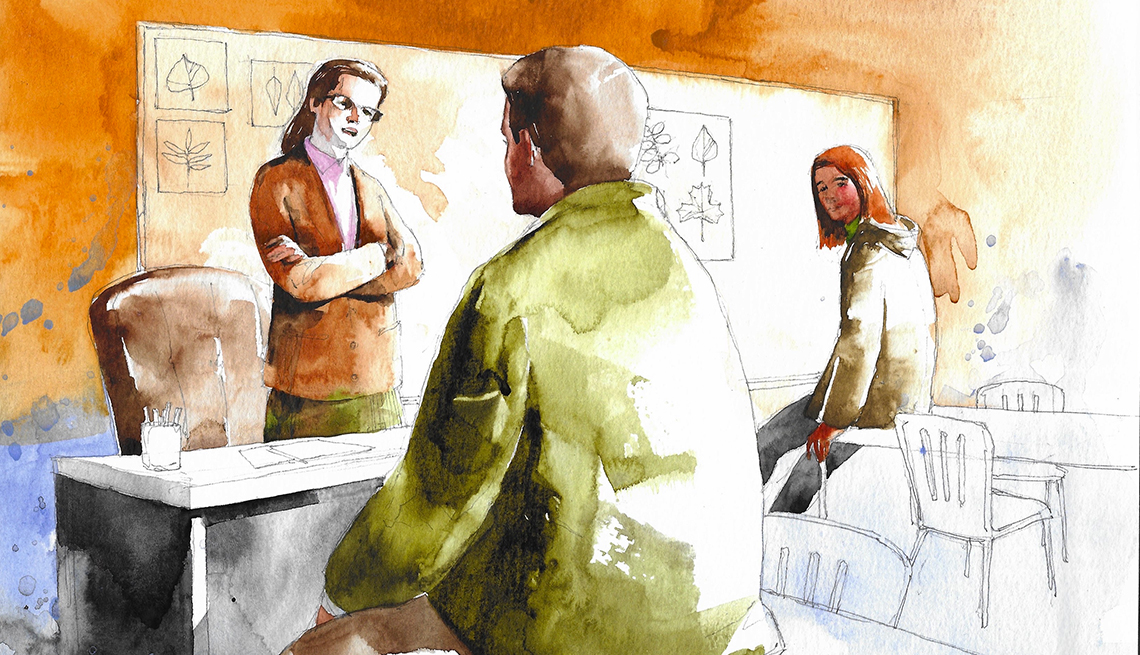
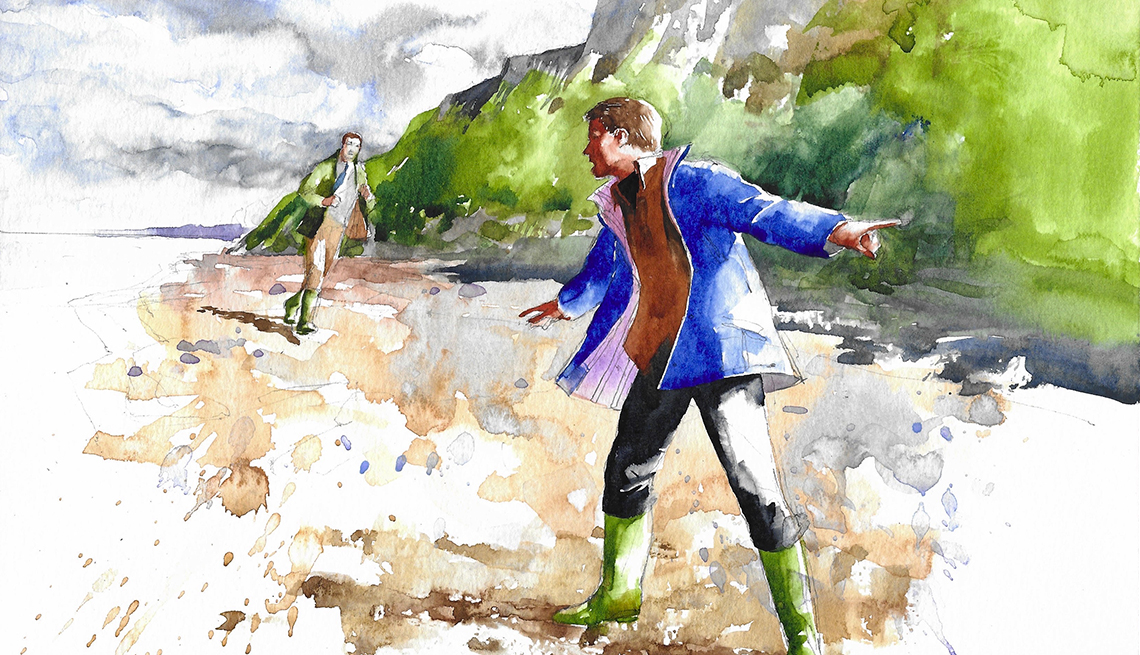
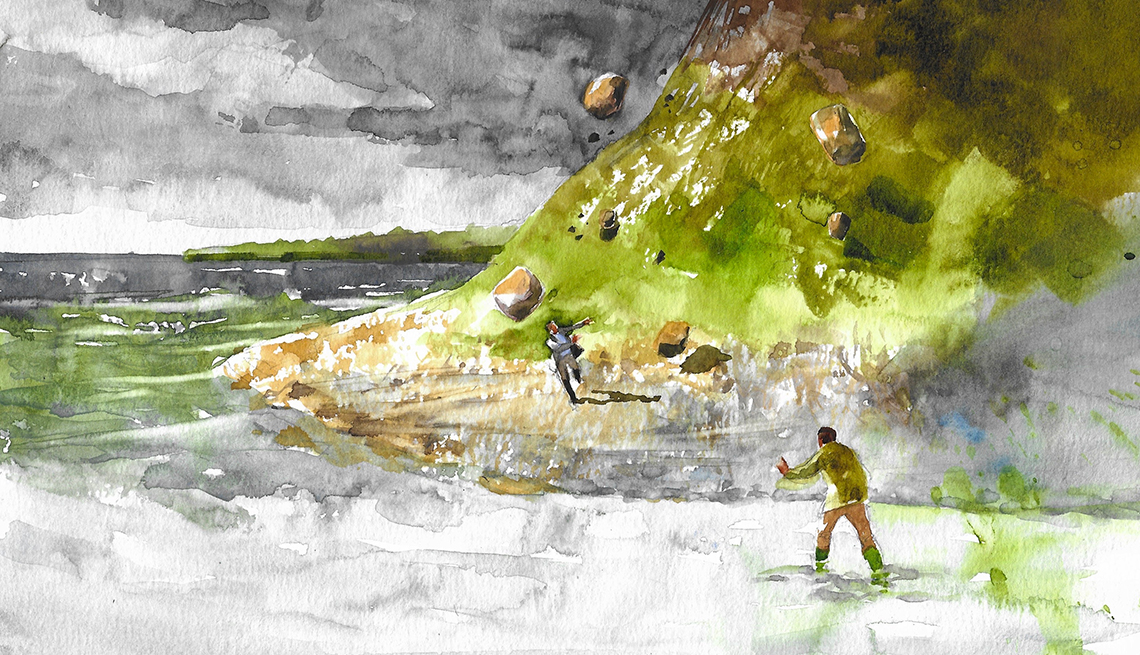

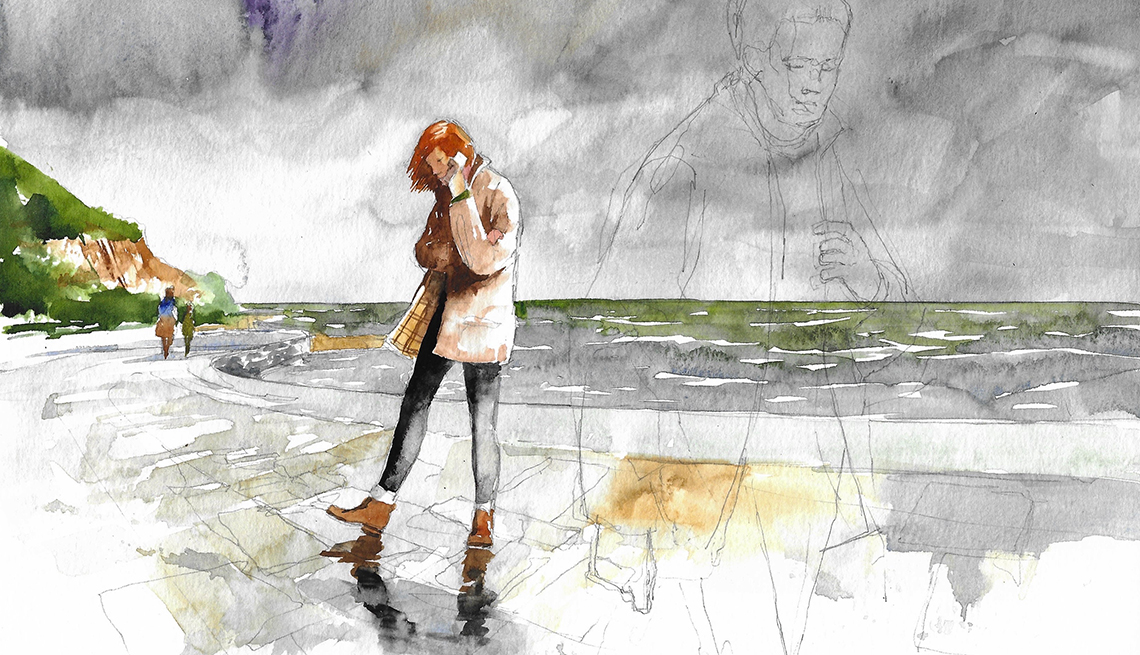
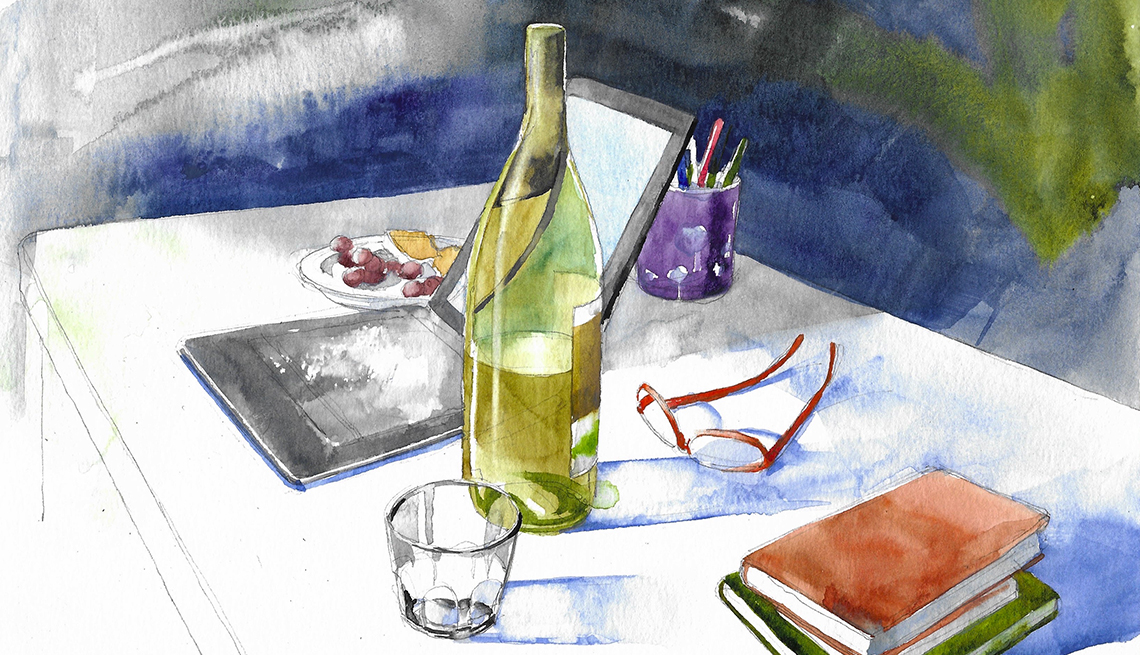
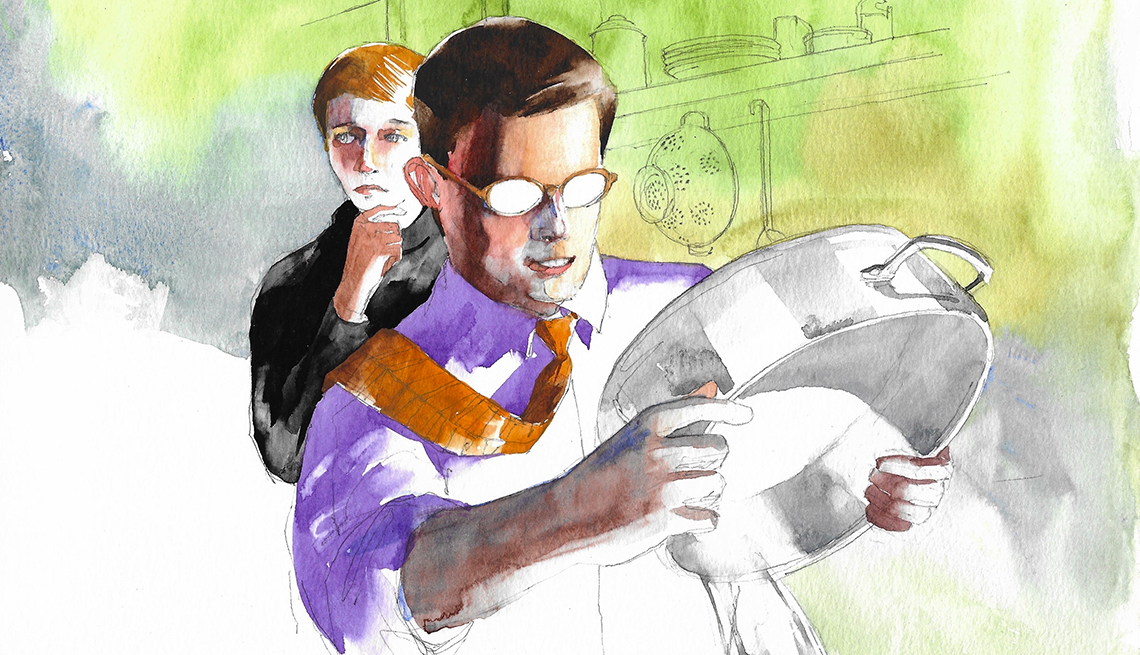







More From Ann Cleeves
‘The Long Call’
Book 1 in the Two Rivers series available free online
‘The Heron's Cry’
Book 2 in the Two Rivers series available free online
Short Story: ‘The Girls on the Shore’
Companion piece to ‘The Raging Storm’ available free online
A Chat With the Author
The best-selling British crime writer shares how ‘The Raging Storm’ differs from the first two books in the series